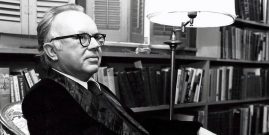A rich, entertaining, and often instructive selection of Russell Kirk’s correspondence.
Restoring the Tools of Liberal Learning
What the so-called student revolution of ’68 brought out into the open was a long-term betrayal of the intellectual integrity of educational institutions and of the scholarly life. These conditions are now erupting again. Political correctness, attacks on free speech, and even violent campus confrontations are now daily fare. In many places the one topic that cannot be part of the general education requirement is the study of the Western tradition, the tradition without which institutions of liberal learning would never have come into existence.
In many respects, it is fitting that 45 years ago this month, Liberty Fund began its publishing line with Education in a Free Society. The volume includes two contributions that spell out the guiding principles and aspirations of Liberty Fund, four essays by major participants in the institution’s early activities that respond to the challenges facing liberal education, and a concluding essay by the mystery novelist Dorothy Sayers, her 1948 classic, “The Lost Tools of Learning.”
Returning to Socratic Conversation
The introductory essay by Anne Husted Burleigh, the volume’s editor, describes the purpose of Liberty Fund and its educational activities. These are focused on Socratic seminars in which a small number of participants, sitting around a table, discuss freely the ideas expressed in great works primarily, but not exclusively, of the Western tradition. A moderator starts discussion with a provocative question and then lets the conversation progress in an open-ended way. These meetings – later on, colloquia were added alongside the Socratic seminars — continue to this day in the format she describes.
The idea is to create a network of people in the academic world, but not only there, who believe in a society of free and responsible individuals and who pursue this vision in their life and work. The goal is not to advance research in the technical sense, but to inspire what Michael Oakeshott called the “conversation of mankind.” In conversation, one offers one’s view of whatever question is at hand as an invitation to others to respond with their views. This is not a debate seeking winners and losers, but a genuine exchange to foster deeper self-understanding through conversation with others who also seek deeper self-understanding and a more profound sense of what it means to be free and responsible, to accept the project of maintaining a society in which individual liberty can flourish in mutual benefit to all participants.
What sort of education is likely to foster these aims? Liberty Fund’s founder, Pierre F. Goodrich, saw that modern colleges and universities, for all their accomplishments, lacked clarity of purpose. Liberty Fund was to be an alternative source of liberal learning free from the complex ambiguities of modern academic life, challenging the existing state of education at all levels in America. Liberty Fund encourages alternatives to the existing system, not to replace colleges and universities, but to be an independent voice, reminding them of their calling, challenging them to remember that liberal education promotes individuality in a most noble sense.
Education succeeds when it fosters the growth of self-understanding in individuals, not to make us all the same, or to imbue in us the same thoughts and aims, for that is antithetical to the natural diversity and individuality of the human condition. State educational systems tend to encourage a collective outlook pursuing programs defined by the state; individuals become role-players directed by managers in a corporate enterprise. The alternative is a society of individuals who, so long as they act peacefully and honestly, are free to do as they think best for themselves. In other words, the state is not to determine the purpose of life for its citizens; rather, it is to provide the basic framework that supports individuals to pursue purposes of their own choosing.
A College for the Free Society
Goodrich coauthored an essay in this volume with Benjamin Rogge. The two offer an alternative to the prevailing system that is revolutionary in concept:
We begin by assuming a society in which the state plays no part in the educational process. Gone would be all state colleges and universities, all public elementary and secondary schools, all public libraries and public opera houses, and so forth.
Goodrich and Rogge think the variety that would occur would be positive for the human condition.
We reject, then, the view that education must be treated as a special case and insist, rather, that it be given precisely the same status as any other good or service in the marketplace. Let each man choose among the alternatives open to him; let each would-be supplier offer his wares in the marketplace, subject only to general rules against fraud.
They go on to describe what they call the “Free Society College,” a place that would “maximize the likelihood that those who are exposed to it will come to be committed to the free society and, equally important, come to know and understand precisely what they are for and against and why.” Since all institutions have some point of view, educational institutions need to declare their point of view, letting people decide where they want to invest their time and money:
It is our conviction that any person of reasonable intelligence who studies the human experience in the manner appropriate to true learning will probably come to the conclusion that the optimal organization of society is that of free and responsible men under limited government and the rule of law.
These principles apply to all levels of schooling and to society as a whole. Organizationally, Goodrich and Rogge advocate a particular authority structure for the governance of their “Free Society College”:
All decisions of policy would be made by the board and implemented by the administration. As in any successful firm, customer (student) and employee (faculty) opinion and responses would be made part of the general information on which policymaking decisions would be based, but in no case would any ambiguity about the location of final authority be permitted.
Hiring would be based on the commitment of potential teachers to the program as declared, although they might permit an occasional dissenter to leaven the conversation. Retention of faculty would be based solely on instructors’ effectiveness in furthering the stated goals of the college. There would be only general requirements to study important topics and major works. No degrees would be conferred, to insure that the college would “serve students truly seeking knowledge, not seeking only a degree or other meaningless relics from the current system.”
They expected hostility to their proposal. But they thought it ought to be offered if there is ever to be real progress. Liberty Fund itself, while not a college, was nonetheless intended to embody a version of the Free Society College, to present a working alternative model to colleges and universities as we know them.
Reason of University
Gottfried Dietze’s essay sets forth an unusual concept, “reason of university,” which names the role of academic leaders and the means they must employ – to defend the spirit of the university. Dietze has adapted the term “reason of state,” which was derived most conspicuously from Niccolo Machiavelli’s view that, in politics, necessity compels one to “use dubious means for less dubious ends,” especially to protect the independence and integrity of the polity. Dietze argues that the goal of the university is the non-dubious (intrinsically valuable) pursuit of truth and that universities can only pursue truth using non-dubious (non-power-seeking) means. The purest experience of individual liberty occurs in the university as a place distinct from politics: “Truth may thus be said to be the teleological apex of ‘value-freeness’ . . . actually being the supreme of all values . . . . Truth is humane by definition.” Truth is not a value we may or may not choose because it has reality whether or not we choose to seek it. In the ideal case, the university is the place where what transcends politics can actually appear.
Dietze argues that the protection of the pursuit of truth from politics has in the 20th century been compromised. Professors too often preach partisan policies rather than seek truth: “It is one of the great paradoxes that as academic freedom received greater recognition than ever before, it became more and more a monopoly of those who tended toward the left.” Dietze objects to the lack of genuine openness in debate. He warns against a tendency to a kind of totalitarianism tragically experienced in Europe in the 20th century.
“Reason of university” prescribes strong administration to prevent the politicization of truth. Administrators must have the courage to withstand “political correctness.” This means curbing the influence of leftism, the primary source of academic corruption. It also means resisting the dumbing down of “excellence” in deference to the egalitarian urge. The threat of “reason of state” or politicization requires resistance through “reason of university.” The terrible upheavals of the 20th century are reflected in debates over the role of the university. Freedom of the university cannot be saved without safeguarding liberty in the polity.
The Few Who Seek Wisdom
Russell Kirk’ s essay herein offers a “non-utopian” model. Kirk notes that the decline of high school education poses the problem of finding students who are ready to undertake a rigorous college program. Assuming some such students can be found, what is the appropriate college for them? It must be a community of teachers and students seeking Wisdom and Truth, a place where students can meaningfully pursue these: “the higher learning is an intellectual means to an ethical end . . . to join knowledge with virtue,” writes Kirk, but the utilitarian and the pragmatic have replaced the hope of virtue with the quest for success – preferring “social adjustment” to “strength of soul.”
We must reject the depreciation of our heritage. The constant emphasis on innovation leads us to forget permanent truths. This means decline in the study of enduring literature, and the temptation of colleges to emulate research universities. Also, colleges have more and more taken their direction from external social demands, compromising their animating spirit. They should restore a traditional, relatively limited curriculum emphasizing thoughtfulness rather than specialization. Teachers should be talented in the conduct of tutorials and small group discussion. Administration should be primarily in the hands of the faculty. Colleges should be “governed by the traditions of reverence, learning, and civility, [which] goes directly against the grain of present-day American education.”
Seeking Social Standing
Henry Manne’s contribution explores the changing organizational form of American colleges and universities. At first there were denominational schools to educate in religious values and to prepare ministers to serve their founding churches. Also there were liberal, elitist institutions, which usually had a denominational foundation but whose aims and aspirations increasingly separated from the founding inspiration in favor of preserving the social standing of a certain upper class of people. In both models, the goal was to produce “a certain kind of education for a select group of individuals.” These institutions operated as non-profit entities enjoying tax-free benefits, defraying the cost of attendance so as to reduce competition for students as consumers of the offered education. The benefit was often social standing rather than vocational success.
State universities emerged, involving a subsidy of the cost of education, and benefiting those who already had access to such education but who could discount the cost of a private system. State education lost coherence as religious education was excluded from the state universities. The universities’ organizational patterns changed with the changing commitments of trustees, administrators, and faculties. Philanthropy was now to support the general idea of “education.” Trustees’ duties in guiding the universities decreased in deference to the diverse faculties of the various institutions.
The subsidy of costs has insulated faculty from assessment in terms of measurable classroom accomplishments. The premium on securing the most academically talented students, who are less trouble and less time-consuming, increases as such students ease the professorial task, allowing more time for research in pursuit of scholarly prestige in the extra-institutional scholarly world. Prestige insures that those with more resources will get even more while those who have less will lag behind.
The free market alternative that Goodrich and Rogge advocate has never had much support. Even if there were significant advantages to this third alternative, the political-economic structure would resist reform, for it could diminish governmental power and curtail the power of the various interests benefiting from the current structure. Manne concludes that universities today attract “people who inherently favor collectivist, statist, nonmarket attitudes . . . heavily financed by taxpayers . . . [excluding] fair consideration of any other doctrine.”
Against “Technicians of Adjustment”
Echoing Manne, Stephen Tonsor writes in his contribution that, “At the present time, typical university presidents are the amoeba-like victims of every aggressive group on campus. . . . they have been technicians of adjustment.” Tonsor also describes the peculiar belief on the Left that universities are centers of power and authority, and that to control them is key to revolutionary transformation of American society. However, such authority as universities hope to exercise demands a sense of their distinctive role in society: “The university cannot, consequently, exercise its authority or sustain itself if it loses sight of the wholeness of society and places its resources at the command of a financial or cultural elite or permits itself to be exploited and victimized by a deviant minority group bent upon aggrandizement and tyranny.” Too often political fashion shapes the character of teachers and curriculum.
The principal barrier to reform is the faculty itself, who need clear vision from visionary leadership. This requires trustees and their administration to reassert control. Dependence on external funding from governments and foundations shifts influence outside the institution itself. Shielding students and their families from the true cost of their education protects institutions from competing on the basis of discernible success as opposed to affordability. Tonsor does not oppose vocational or professional training. But to universalize classical learning inevitably means redefining what we mean by that in an antithetical direction. Colleges and universities
cannot function in the world of power . . . the price of their continued existence is a rededication to the life of the mind, the master-student relationship, and the authority in education and society which derives from these educational commonplaces.
Back to Permanent Things
In “The Lost Tools of Learning,” Dorothy Sayers proposes a most “improbable reform”:
If we are to produce a society of educated people, fitted to preserve their intellectual freedom amid the complex pressures of our modern society, we must turn back the wheel of progress some four or five hundred years, to the point at which education began to lose sight of its true object, toward the end of the Middle Ages.
The universalization of literacy has led to advertisement and mass-propaganda. The ability to distinguish fact from opinion declines. Sayers insists that teaching “subjects” does not equate to learning how to think. The medieval approach, through the trivium and quadrivium, began with acquiring the tools of learning as the prelude to learning and analyzing specific subjects. In modern terms, we teach students to read but neglect the task of reading intelligently and with concentrated attention. We are now bombarded by words printed and spoken such that we know more in one sense and know less in a deeper sense.
What Sayers seeks is actually to recover certain permanent insights that were well understood once, and that are accessible to us now, if we look for them. We lose permanent insights not because they are not available, but because we have been seduced by presentism or not been told about them. This should open us to more serious inquiry into what education is for. The true end of education is to teach us how to learn for ourselves.
The Sayers essay expressed one aim of Liberty Fund before the organization came to be. All of the essays in Education in a Free Society exemplify discussion among thoughtful individuals who share a common understanding of the derangements to be overcome.


